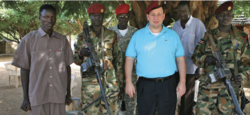
dClimate co-founder Philippe Heilberg with soldiers loyal to the South Sudanese warlord General Paulino Matip Nhial, during his efforts to secure over 400,000 ha of land for farmiing for his then company Jarch Capital. (Photo: Jenn Warren)
Billionaire Mark Cuban backing $1 billion Congo carbon plan
By Michael J Kavanagh
A climate startup backed by investors including billionaire Mark Cuban signed a preliminary deal to generate $1 billion of carbon credits by preventing deforestation across a swath of the world’s second-biggest tropical forest.
dClimate plans to pay Democratic Republic of Congo a fee for the rights to the sequestration of 100 million tons of carbon dioxide or the equivalent on about 500,000 hectares (1.24 million acres) of peatlands for a decade, it announced Tuesday. The company will monitor the land to show that deforestation is being prevented, help Congo develop a carbon-credit registry, and sell the credits generated on the open market.
“We will pick this particular area and make these payments contingent on that area being preserved and continuing to be preserved over the next decade,” dClimate co-founder Siddhartha Jha told Bloomberg in an interview. The credits could be worth about $1 billion over the duration of the contract, Jha said.
Proponents of carbon offsets see Congo’s forests and peatlands as one of the most important largely untapped sources of credits, which companies, governments and individuals can buy to offset their own emissions. Peatlands store carbon because the waterlogged conditions prevent organic matter from fully decomposing and releasing carbon back into the atmosphere.
Untapped Source
For the credits to have environmental and market value, dClimate will need to show that they’re paying for peatland protection that wouldn’t have happened anyway. Neighboring countries like Gabon have struggled to sell carbon credits from land that hasn’t historically been under threat on the basis they don’t align with this principle of additionality.
The World Bank estimates Congo’s forests capture 822 million tons of greenhouse gas annually, making the country’s credits potentially worth billions of dollars if additionality can be proven. About 60% of the Congo Basin forest lies in the country with much of the rest in countries including Cameroon and Gabon.
Still a string of investigations by climate activists and academics has raised serious questions about some of the offsetting claims attached to such credits. Research published in August in the journal Science found that only 6% of offset projects studied were linked to additional carbon reductions through preserved forests.
Concerns about integrity mean Congo’s credits trade at only about $5 dollars on the so-called voluntary market, a huge discount from credits in the more regulated markets of the US and European Union. At that price, it doesn’t necessarily make economic sense to preserve the forest, according to Congo’s government.
Jha predicts dClimate can get $7 to $10 for its credits, because the company’s technology and the new registry will reassure investors they’re buying legitimate offsets.
The company will keep about 10% to 20% of credit payments as a fee, Jha said.
The deal, which has been under negotiation for two years, is “a stride toward balancing ecological preservation with our national growth,” Stephanie Mbombo, Congo’s special envoy for the new climate economy, said in a statement sent to Bloomberg by dClimate.
Mbombo, who is running for parliament in elections set for Dec. 20, could not immediately comment further when contacted Tuesday.
Cuban and Chainlink founder Sergey Nazarov are both investors and are on dClimate’s advisory board along with J. Peter Pham, the former US Special Envoy to the Great Lakes Region of Africa. Cuban is worth $6.5 billion, according to the Bloomberg rich list.
The company hopes to start the Congo project in 2024 after signing a final contract.













